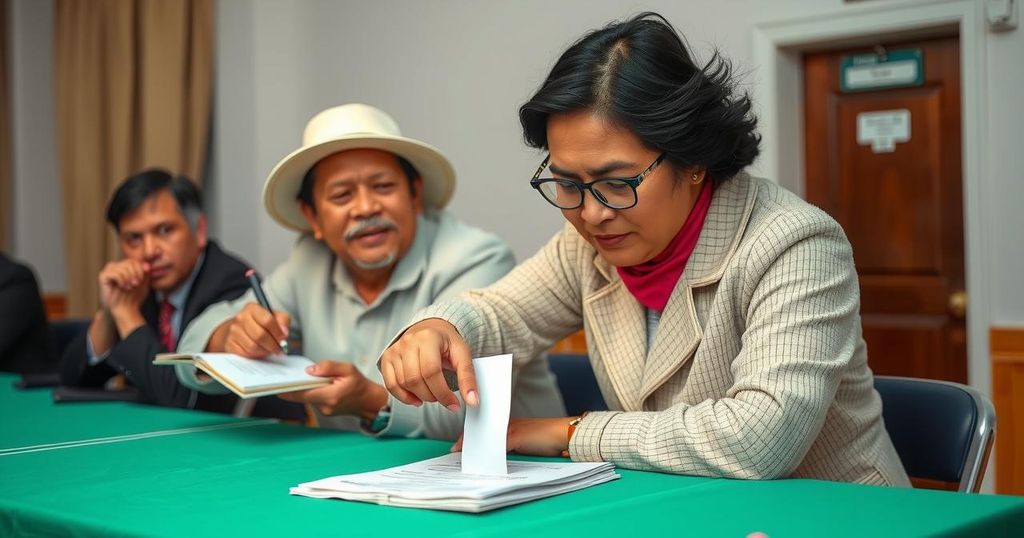World news
ANDRES MANUEL LOPEZ OBRADOR, ASIA, ASSOCIATED PRESS, BOLIVIA, CONSTITUTIONAL COURT, CORRUPTION, CUBA, DEMOCRACY, EL SALVADOR, EV, EVO MORALES, LATIN AMERICA, MARIS, MARISOL NOGALES, MEXICO, NORTH AMERICA, OPPOSITION, PHILIPPINES, POLITICS, SOUTH AMERICA, THE ASSOCIATED PRESS, TRADE RELATIONS, TRIBUNAL
Oliver Grayson
0 Comments
Bolivia’s Judicial Elections: A Spotlight on Democracy and Political Dynamics
Bolivia is unique in electing its top judges through public voting, leading to considerable debate about the process’s effects on judicial independence. Recent political turmoil, particularly surrounding election delays and the struggles between President Luis Arce and former President Evo Morales, raise alarms about the legitimacy of these elections. As international observers watch closely, the case of Bolivia serves as a cautionary tale regarding the potential politicization of judiciaries in Latin America.
Bolivia’s judicial elections illustrate the complexities surrounding democratic governance in Latin America. Unlike any other country, Bolivia elects its highest judicial officials through popular voting, a system that some view as a means of enhancing democracy, while others consider it a mechanism that compromises judicial independence.
The upcoming elections have been marred by political strife and controversies, particularly surrounding the delay in the electoral process executed by the Constitutional Court, which favors President Luis Arce. Critics argue that this delay undermines the legitimacy of the electoral system and creates a troubling precedent for politicizing the judiciary.
Historically, Bolivia’s approach to judicial appointments has evolved from one based on qualifications to a system that rewards political loyalty. This transformation began under former President Evo Morales, who overhauled the judiciary in 2009 with intentions of eradicating corruption and promoting democratic principles. However, citizens express skepticism about an electoral process that offers little transparency and a complex ballot, leading to disengagement and low voter turnout during previous elections.
The election cycle has exacerbated tensions within Bolivia’s ruling political faction, particularly between Morales and Arce, who are vying for control over the leftist political landscape. As the vote approaches, many Bolivians remain uncertain about an electoral process that has turned judicial positions into political prizes devoid of impartiality. The upcoming election poses a significant challenge for the Bolivian democracy as it reflects deeper patterns of judicial manipulation exercised by political leaders, raising further questions about the viability of the electoral system.
Bolivia stands out as the only nation globally to facilitate the election of its top judges through public voting. This electoral approach was introduced over a decade ago and has faced significant criticism for its impact on judicial independence. Strikingly, recent controversies surrounding the judicial electoral process, including postponements led by the Constitutional Court, underscore the ongoing strife within Bolivia’s political landscape, particularly in the struggle for power between factions of the ruling party. Observers note that Argentina, Switzerland, and Japan also conduct some form of judicial elections, yet none do so quite like Bolivia. Political leaders often justify reforms as a way to enhance democracy and combat corruption. For instance, liberal reforms under Evo Morales were met with public approval before criticism began to proliferate regarding the system’s inherent flaws. As countries like Mexico prepare to adopt similar electoral systems for their judiciary, the Bolivian experience offers critical insights into the potential ramifications of politically charged judicial elections. The effectiveness and legitimacy of Bolivia’s upcoming elections have become paramount as experts watch closely how this unfolds.
In conclusion, Bolivia’s approach to electing judges via popular vote raises significant questions about the integrity and independence of the judiciary. While intended to increase democratic engagement and eliminate corruption, the process has largely resulted in political entanglements that undermine its objectives. The upcoming elections serve as a crucial case study in assessing the balance between democracy and the political manipulation of judicial systems, especially as countries like Mexico consider similar reforms.
Original Source: abcnews.go.com




Post Comment